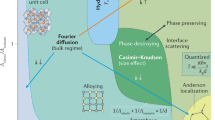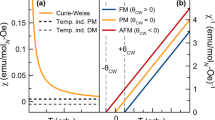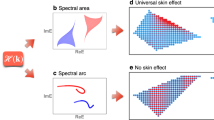Abstract
PIPPARD1 has recently made an experimental and theoretical study of the skin effect in metals at high frequencies, in which he showed that the usual theory of the effect is no longer valid at low temperatures owing to the breakdown of Ohm‘s law when the free path of the conduction electrons becomes comparable with the penetration depth of the electric field. With the aim of putting Pippard‘s provisional theory of the anomalous effects on a more rigorous basis, we have reformulated his equations using the methods of the modern electron theory of metals, and we have succeeded in obtaining explicit solutions which make it possible to give a quantitative account of the phenomena to be expected over the whole frequency and temperature-range.
This is a preview of subscription content, access via your institution
Access options
Subscribe to this journal
Receive 51 print issues and online access
$199.00 per year
only $3.90 per issue
Buy this article
- Purchase on Springer Link
- Instant access to full article PDF
Prices may be subject to local taxes which are calculated during checkout
Similar content being viewed by others
References
Pippard, A. B., Proc. Roy. Soc., A, 191, 385 (1947).
Wilson, A. H., "The Theory of Metals", 158 (Cambridge, 1936).
Titchmarsh, E. C., "Introduction to the Theory of Fourier Integrals", chap. 11 (Oxford, 1937).
Pippard, A. B., Proc. Roy. Soc., A, 191, 399 (1947).
Author information
Authors and Affiliations
Rights and permissions
About this article
Cite this article
REUTER, G., SONDHEIMER, E. Theory of the Anomalous Skin Effect in Metals. Nature 161, 394–395 (1948). https://doi.org/10.1038/161394a0
Issue Date:
DOI: https://doi.org/10.1038/161394a0
Comments
By submitting a comment you agree to abide by our Terms and Community Guidelines. If you find something abusive or that does not comply with our terms or guidelines please flag it as inappropriate.



